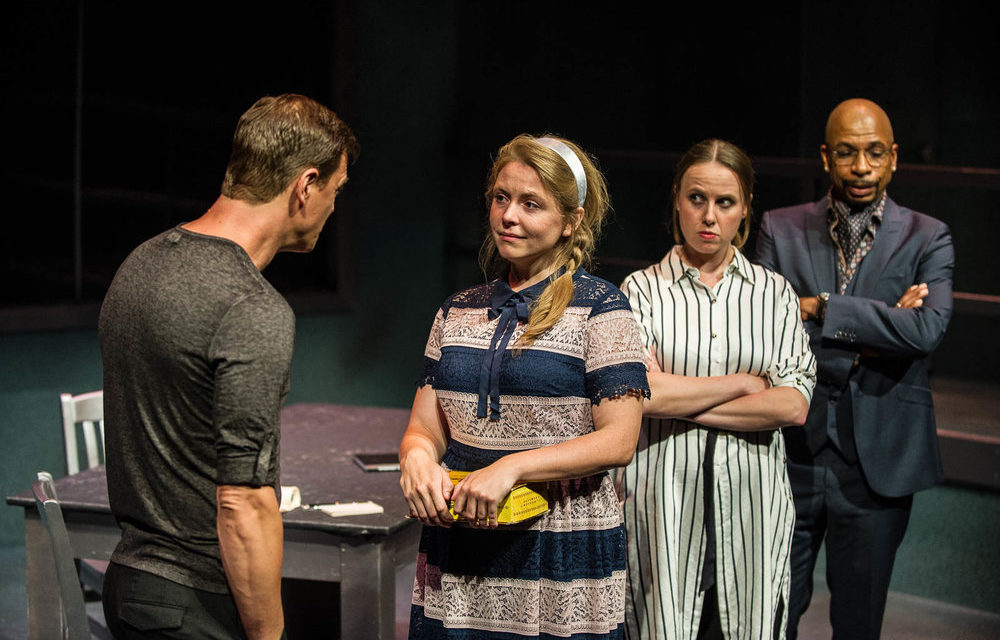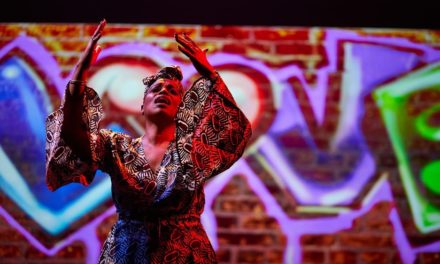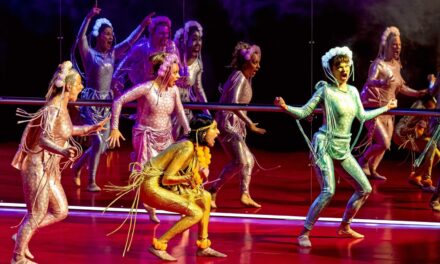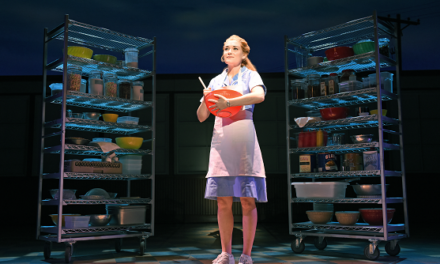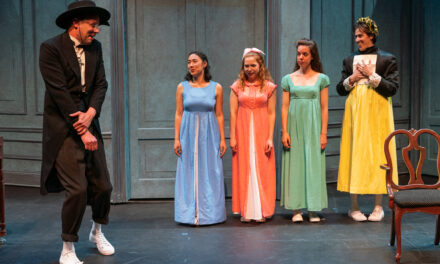Kate Hennig’s The Virgin Trial is a stunner of a play. Hennig’s whip-cracking dialogue, laced with tart humor, is delivered with precision by a uniformly excellent cast taking the audience on a perilous journey through the fecund hedge maze of sexual desire and political intrigue. Based on the pre-Queen adolescent life of Elizabeth the First, or Bess, played with vibrating intelligence by Lydia Riding, The Virgin Trial mines history for its known facts, and takes flight.
The principle to our plot is the suspicious and possibly abusive relationship young Bess endured (or found a way to tolerate) at the hands of Attila Clemann’s amusingly muddled and misguided Thom when she was his ward. This living arrangement put Bess in Thom’s household, placing her dangerously close to his attempt to kidnap her half-brother, the young and perilously fragile King Edward (Eddie in the play). It was an act of bungled treason, but was Bess somehow involved? Complication alert, we are awash in the wake of Henry the Eighth and the fallout from his frantic gallop through six wives.
And we’re in The Tower, if not of London then, courtesy of Jennifer Goodman’s architectural brutalism, a place where if you’re too high up the ladder to be wracked and torn, you can listen to the ominous sounds of suffering from other rooms. Bess’s lot is to be pummeled by questions. Witness her chief interrogators, Ted, played with menacing congeniality by Chris Ralph, and Eleanor, portrayed with coiled coolness by Kristina Watt. Ralph serves up a genial interrogator, one part sympathetic, the other imbued with the loathsome ability to blithely dismiss evidence of torture; in one scene you would think a slightly messy tea party had just occurred. Watt is less subtle. She’s out to eviscerate her girl and does so with the admirable skill of a woman in Tutor times rightly trained to carve and joint the most stubborn fowl.
Hennig’s genius lies in taking us on a historical journey with the added bliss of some sharp right–and left–turns of her own devising. There are many contemporary resonances in this riveting play, a true whodunit. The shadows of our collective sins hang over the interrogation of those not of noble birth. But it is a shadow. First and foremost, this is a play about one young extraordinary girl caught up in extraordinary circumstances. And how she wiggles her way out.
History, for the most part, settles into unsatisfying ambiguity over Elizabeth’s complicity in plots to steal the throne she eventually ascended. Was she or wasn’t she guilty, or still a virgin, by the time she donned the crown she would wear for some forty plus years is a question never definitively answered by legions of biographers. And, in this production, don’t look to Attila Clemann’s Thom to set the record straight. His winning portrayal of Bess’s ticklish lover, finding excuses to get under her covers, drunk, sober, or sleepy, makes one wonder if he’d even remember if he did deflower a princess. But Hennig’s historical imaginings are crystal clear as she boldly casts Bess in a brilliant, harsh light, pulling in characters such as Bess’s half-sister, Queen Mary, played with panache by Anie Richer, from an unrecorded periphery, cunningly re-imagined as a sisterly advisor. Yet Richer’s Mary still recalls her character’s infamous ill health with flashes of acerbic mirth. (Please, she sneezes, no more conspiratorial confabs in bad weather!)
Bess’s advocates, or co-conspirators, take your pick, are Ashley played by Kate Smith and Parry played by Cassel Miles. Dutiful, loyal and caring, they arouse our sympathy for those roped into suffering on behalf of their betters. As much as Smith is a sympathetic window on Bess’s fiercely loyal ladies maid, Miles is a courtier delicately serving up the playwright’s humor.
The Virgin Trial is a fresh portrait of a woman born to rule, whether as Queen of the past, or potential CEO of the present. The playwright’s unflinching focus, the character of an adolescent, used, possibly abused, is still resolutely a King’s daughter, schooled in the art of rhetoric and logic, unbowed and seemingly incapable of losing her head, literally or figuratively.
In this rigorously well-paced production, Eric Coates, obviously in love with the playwright’s words and characters, has pulled together an exemplary cast and given them the freedom to fly, coupled with the boundaries to confound. Some delightful touches such as meetings in the rain, the tense service of the long-awaited tea, the spare deployment of Martin Conboy’s lighting design, and the final appearance of Bess in a costume by Jennifer Goodman, slyly reminiscent of Tutor regality, all testify to a director who has not only led his entire creative ensemble through a royal maze, but jumped its hedges to arrive at a beautifully realized world on the verge of catastrophe–or a golden age. This Virgin was born to rule the stage, and likely will for some time to come.
This article first appeared in Capital Critics’ Circle on September 13, 2018, and has been reposted with permission.
This post was written by the author in their personal capacity.The opinions expressed in this article are the author’s own and do not reflect the view of The Theatre Times, their staff or collaborators.
This post was written by Laurie Fyffe.
The views expressed here belong to the author and do not necessarily reflect our views and opinions.

